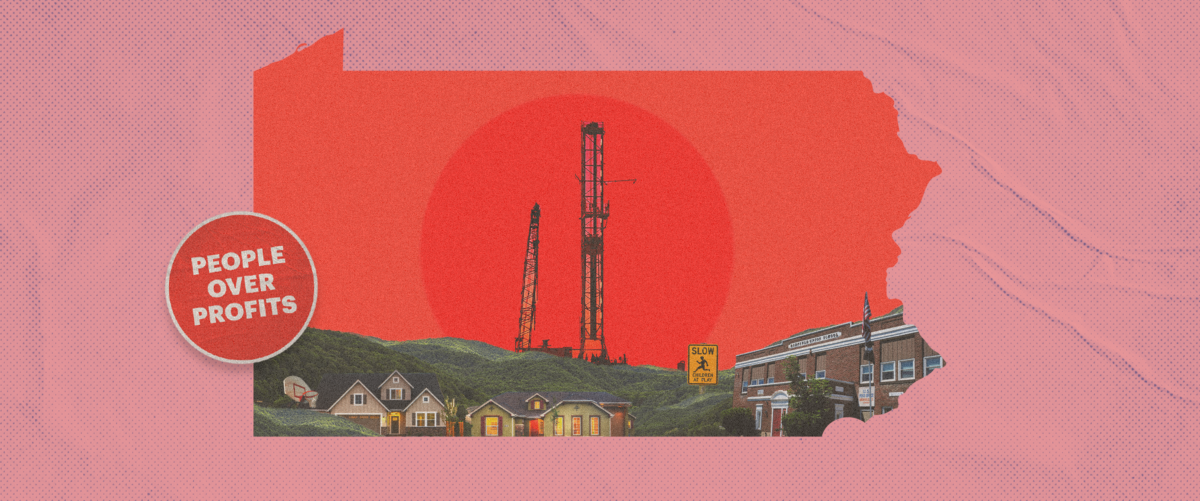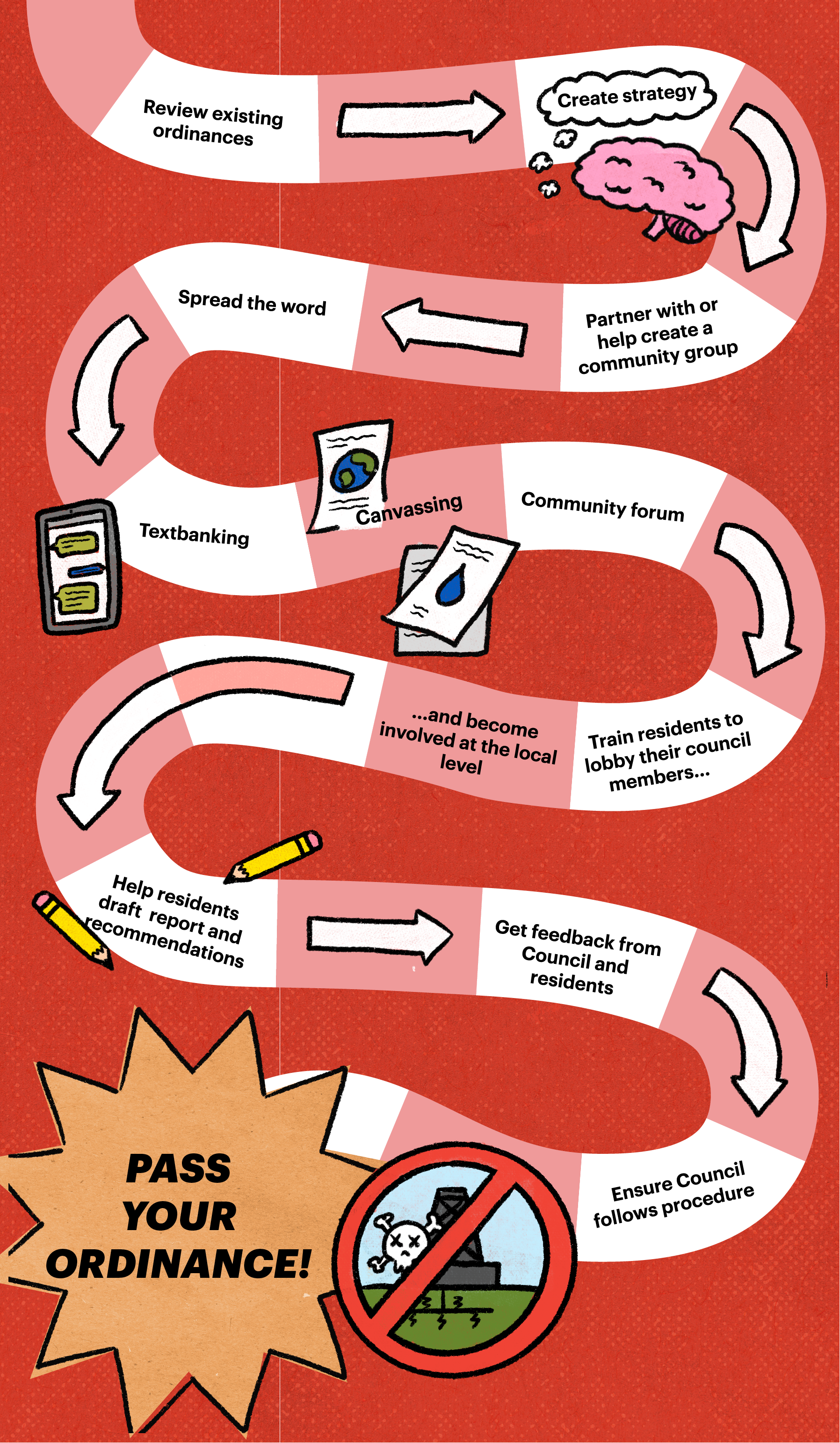Zoning & Ordinances: How YOU Can Fight Fracking in Your Backyard!
Published Jul 23, 2025

By passing municipal zoning ordinances through local government, Pennsylvanians can prevent fracking in their communities. Here’s what you need to know.
Food & Water Watch’s Municipal Ordinance Project wields the power of local governments to pass measures that ensure the health and safety of their residents. So far, it’s the most successful tool Pennsylvanians have to combat the worst impacts of the fossil fuel industry.
Pennsylvania has a unique patchwork system of local government spanning 2,560 municipalities. Like all governments, its system isn’t perfect. But municipalities have a substantial amount of say and sway, so they largely get to set their own standards.
This, in turn, can create more responsive and customizable governance, with more direct participation from residents. With public participation and engagement, Pennsylvanians can tell local officials their priorities — and see tangible change.
Over two decades after the shale gas boom of the early 2000s, the overwhelming majority of Pennsylvanians want more and better regulations. Zoning and ordinances can help to accomplish this.
The Basics of Zoning and Ordinances
Crucially for the Municipal Ordinance Project, municipal governments make land use decisions. They choose where and how much land is used for what activity. Guided by the Municipal Planning Code, municipalities can decide the balance between green spaces, industrial activity, residential priorities, and natural resource/mineral management. This power, in turn, determines things like population density and access to housing, jobs, and transportation.
Municipalities use two tools to do this: zoning, which regulates land use and activities, and ordinances, which enshrine zoning rules into law. Boroughs and townships can adopt their own ordinances, which supersede county regulations. But not all municipalities have zoning ordinances on the books, in which case the county’s laws become the rule of the land.
Since zoning ordinances balance industrial development, how can they also weigh residential priorities?
Say, for example, you live in a neighborhood zoned “residential.” Your township’s ordinances say that all homes must be built in the residential zone, while all industrial infrastructure must be confined to an industrial zone. If a developer wants to build a gas station right next to your home in the residential zone, then the township must deny that request.
No one wants a gas station next to their home, and ordinances like these help preserve residents’ quality of life. But ordinances that prohibit an otherwise legal use of land are considered “exclusionary” and are illegal in Pennsylvania. The local government can’t ban gas stations, but they can determine where they will go in their municipality.
The same goes for well pads and other fossil fuel infrastructure. While fracking is a permitted use in Pennsylvania and municipalities can’t ban it, they can regulate where the activity can occur. This makes zoning and ordinances important tools in protecting communities.
Combatting Oil and Gas in Your Municipality
Pennsylvania’s vast shale gas reserves have attracted some of the world’s largest energy companies right into our backyards — literally. In the state, well pads can be placed a mere 500 feet away from residential buildings and other protected structures.
This is much closer than the 2,500 feet some experts recommend and the one-mile setback from homes that Pennsylvania environmental groups are fighting for. The current 500-foot setback was chosen arbitrarily in 2012, with the oil and gas industry’s influence shaping state fracking policy at the time.
While we need action at the state level to protect all Pennsylvanians, municipalities have substantial power at their disposal. And when residents — like you — make their voices heard, they can pass powerful protections. More and more residents across the state are doing just that.
For example, last year, Cecil Township supervisors passed an ordinance that requires 2,500-foot setbacks from protected structures and 5,000-foot setbacks specifically from schools and hospitals. This was a powerful protection for residents who reside in one of the most heavily fracked places in the country. The town’s residents stridently supported these changes.
Though fracking company Range Resources contested the ordinance, the Township Zoning Hearing Board voted 2-0 to dismiss the challenge, preserving this crucial protection.
Pennsylvanians need protections like these. More than 20 years after the shale gas boom exploded in the state, the overwhelming majority of residents want more and better regulations. Zoning and ordinances are accessible tools that any resident can advocate for to accomplish this.
That’s where Food & Water Watch can come in. With the Municipal Ordinance project, we help communities develop and advocate for protective ordinances. Here’s what our process looks like:

To learn more about how you can pass protective ordinances in your town, join our virtual webinar on August 5!
Local Government is More Important Than Ever
Pennsylvanians deserve protections and need them now. We don’t have time to wait. With the Trump administration’s severe overreach on the autonomy of state governments and similar attacks on local governments coming from Harrisburg, getting involved in your local government is more important than ever.
Whether it’s showing up for a commissioners’ meeting, attending a public hearing, or writing letters to your local elected officials, your voice matters. YOU have the power to protect your community from the harms of fracking.
Food & Water Watch has years of experience working with communities to pass 35 Pennsylvania ordinances and counting. Together, these ordinances have protected over 530,000 people from dirty energy infrastructure!
Are you someone who wants better for their community? Send an email to [email protected] to learn how you can start the process of passing a protective ordinance!
Enjoyed this article?
Sign up for updates.
TO TOP


